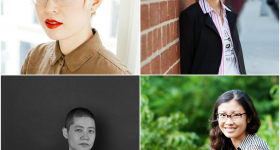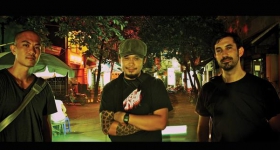It began with papaya seedlings covertly planted on a narrow strip of grass between a roadway and a chain-link fence.
Gaye Chan and her partner, Nandita Sharma, deliberately placed the plants on public land without permission or regret. For a few months in late 2003, the young plants flourished there in the shadow of green, creased cliffs on the windward side of Oahu, HI. A small hand-painted placard declared them for public benefit and use.
A few months later, the sign became the site of a written exchange between the planters and the public works employee sent to remove the intruding plants. The worker’s apologetic, “Sorry, I’ve been instructed to remove papaya plants ... please transplant,” was countered with, “Thanks for the notice but we can’t think of any other place better than here where everyone has easy access to the free papayas.” Shortly afterward, the government worker uprooted the plants, leaving only a note recommending the services of a mediator.
“Where is the public in public land?” Chan and Sharma asked. “Who decides how space is used?” These are some questions posed in their decade-long artistic project, Eating in Public, a loose web of projects ranging from unpermitted gardens to strident agitprop publications.
Considerations of public space and the ability of everyday citizens to engage with or provide for one another are issues that have echoed throughout history, resounding most recently in the tense dialogues between civic leaders and defiant 2011 Occupy protests across the United States. The goals of the Occupy movement have been economic equality, but the visual language of tents and other activist vernacular created in the public squares, parks and streets has been where these demands have been articulated, or forcibly squashed.
Even elected officials acknowledge the importance of this connection between the visual language and interventions into public space in both their support and resistance: The City Council of Irvine, CA, declared tents an extension of protected free speech while New York City Mayor Michael Bloomberg dismissed the same as preposterous. Thousands of marching bodies filling avenues and the hodgepodge, utilitarian mix of makeshift homes and gathering spaces inserted into public space have reset the terms for understanding and discussing unwieldy and broad concepts like civics, government and corporations.
This is a preview of Issue 25: The Generation Issue, available now. Subscribe to Hyphen or pick up a copy at a newsstand near you.









Comments